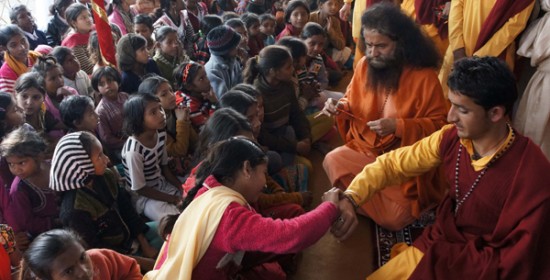National Day of the Girl Child
January 24, 2013
Girls Worshipped at Kumbh Mela to Promote Respect and Awareness on National Girl Child Day
Allahabad – The National Day of the Girl Child was celebrated at the Maha Kumbh Mela today at the Ganga Action Parivar camp with a unique ceremony in which 60 daughters of low-caste fishermen were worshiped by priests in training as goddesses. The ceremony was led by Pujya Swami Chidanand Saraswatiji, President of Parmarth Niketan Ashram, Rishikesh and founder of Ganga Action Parivar,
The ceremony, which is practiced in some parts of India during the Navaratri Festival, has never before, in knowledge, been performed at the Kumbh Mela, the largest gathering of humanity in the world. Its purpose is to shed light on India’s girl children as worthy of respect and reverence.
India just recently was named by a United Nations study as the most dangerous nation in the world in which to be a little girl. Much of this hinged on the widening gender imbalance within the country due to infanticide, selective-sex abortion and deliberate neglect.
Said HH Pujya Swami Chidanand Saraswatiji, said of the inspiration behind the event, “Girls represent the past, present, and future of Mother India. They must be allowed to grow and thrive if India is to grow and thrive.” Pujya Swamiji is also the founder of Divine Shakti Foundation, a non-profit organization dedicated to providing education, vocational training and empowerment to impoverished women and girls.
According to a study by the Canadian Medical Association, India will have 20% more men than women within the next 20 years unless the gender imbalance – propagated by selective feticide, infanticide, and deliberate neglect — is immediately corrected. Already, instances of crimes such as rape have risen by 800% since selective-sex abortion became a common practice some 40 years ago. The trafficking of women and girls into prostitution and forced marriage are also on the rise, as are instances of one woman being forced to marry more than one man.
Said HH Pujya Swami Chidanand Saraswati, “If we are to prevent the horrific crimes such as the bus incident in Delhi in the future, then we must all live and spread the message that women and girls are divine and worthy of worship.”
In addition, involving girls in Ganga Action Parivar’s projects is particularly important, as many of the disparities found within the Ganga River Basin affect women and girls the most. Lack of proper sanitation facilities in villages, schools and other institutions force women and girls to venture to areas often far removed from where they live, such as the sides of roads and forests, putting them at great risk. Many girls do not have access to schools which have proper sanitation facilities for them (sometimes, no facilities at all), and thus are not able to continue their education. Additionally, due to lack of proper water facilities, many children, especially little girls in remote areas of the Ganga Basin, have to stay home from school in order to fetch water from far-away water taps. Thus, the work Ganga Action Parivar is doing to bring eco-friendly toilets and access to clean water is especially important to these little girls.
-
-
National Girl Child Day - Kumbh Mela 2013 (1)
-
View Picture
-
-
-
National Girl Child Day - Kumbh Mela 2013 (2)
-
View Picture
-
-
.jpg)
-
National Girl Child Day - Kumbh Mela 2013 (3)
-
View Picture
-
-
.jpg)
-
National Girl Child Day - Kumbh Mela 2013 (4)
-
View Picture
-
-
.jpg)
-
National Girl Child Day - Kumbh Mela 2013 (5)
-
View Picture
-
-
.jpg)
-
National Girl Child Day - Kumbh Mela 2013 (6)
-
View Picture
-
-
.jpg)
-
National Girl Child Day - Kumbh Mela 2013 (7)
-
View Picture
-
-
.jpg)
-
National Girl Child Day - Kumbh Mela 2013 (9)
-
View Picture
-
-
.jpg)
-
National Girl Child Day - Kumbh Mela 2013 (10)
-
View Picture
-
-
-
National Girl Child Day - Kumbh Mela 2013 (13)
-
View Picture
-



